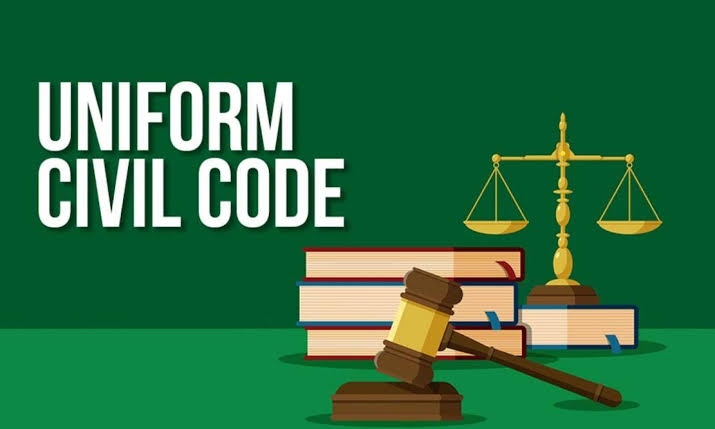Secularism and Social Justice : The Role of the Uniform Civil Code
The Uniform Civil Code (UCC) refers to a common set of laws prevailing on the personal matters of all citizens irrespective of their religion. UCC deals with aspects like marriage, divorce, inheritance, succession, adoption, etc. The objective is to have secular law overriding religious laws that regulate these aspects for different communities. India is a country of multi-religions and multi-languages. Several people are governed by their laws. It leads to different treatment meted out to different classes

Ruling Government’s assertive stance on the UCC, as part of the 2024 general election campaign, reflects the longstanding agenda of the Bhartiya Janata Party (BJP) to implement the UCC.
INTRODUCTION
India is a diverse country with various personal laws such as the Hindu Marriage Act, the Parsee Marriage Act, the Christian Marriage Act, the Muslim Personal Law, and the Divorce Act governing the people of their respective communities. Some laws have found their way to modernity through various enactments but still, some laws remain unaltered which creates a barrier to attaining equality, homogeneity of legislation, non-discrimination, and secularization.
IMPLEMENTATION OF UCC IN INDIA
What is UCC? As per Article 44 under the Directive Principle of State Policy, our Indian Constitution states: The State shall endeavour to secure for the citizens a uniform civil code throughout the territory of India. Article 37 of the Indian Constitution states that part IV of the constitution, regardless of its intrinsic importance to the nation's government, is unenforceable in any court.
The Uniform Civil Code (UCC) refers to a common set of laws prevailing on the personal matters of all citizens irrespective of their religion. UCC deals with aspects like marriage, divorce, inheritance, succession, adoption, etc. The objective is to have secular law overriding religious laws that regulate these aspects for different communities. India is a country of multi-religions and multi-languages. Several people are governed by their laws. It leads to different treatment meted out to different classes of people in their laws.
Birth of the concept of UCC in India
The issue over the Uniform Civil Code gathered traction during the drafting of the Indian Constitution. Dr. B.R. Ambedkar, the key author of the Indian Constitution, was a staunch supporter of a UCC. He argued that a single civil code would help to eliminate gender discrimination and promote the Constitution's principles of equality and justice.
However, religious and cultural concerns made creating a Uniform Civil Code a contentious matter. India is a diverse country with a wide range of religions and customs, and many people believe that personal rules should be left to religious communities to preserve their cultural identity.
After the Shah Bano case in 1985, UCC became a significant political issue in India. The topic of discussion was how to apply some rules to all citizens without impairing their basic right to exercise their religion. The discussion then shifted to the Muslim Personal Law, which allows for unilateral divorce and polygamy and places it under the legal application of Sharia law. The Muslim Personal Law is partly based on Sharia law. Twice, in November 2019 and March 2020, a UCC law was suggested; however, it was withdrawn without being introduced in the parliament.
UCC AND SECULARISM
Now the question arises, what does the Uniform Civil Code have to do with Secularism?
As the Uniform Civil Code does away with the concept of personal laws concerning marriage, divorce, and succession, the codified uniform laws need sustained attention on Secularism because as per the preamble of our Indian Constitution, India is a Secular Democratic Republic.
The kind of secularism India follows cannot be aligned with US and the European Countries.
The Secularism India follows is “Positive Secularism” i.e. recognizing the presence of all religions and their practices and treating all religions with equal respect without interfering in their affairs even though many of their practices could violate democratic principles.
UCC is innately connected to Secularism as implementing a common civil code will promote equality and justice for every citizen across different communities. Freedom of religion is guaranteed under Articles 25 and 26. Article 25 guarantees every person the freedom of conscience and the right to profess practice and propagate religion.
But this right is subject to public order, morality, and health and to the other provisions of Part III of the Constitution. Article 25 also empowers the State to regulate or restrict any economic, financial, political, or other secular activity, that may be associated with religious practice, and also to provide for social welfare and reforms.
The protection of Articles 25 and 26 is not limited to matters of doctrine of belief. It extends to acts done in pursuance of religion and, therefore, contains a guarantee for ritual and observations, ceremonies, and modes of worship, which are integral parts of religion. Article 27 is another consequence of secularism. It states that no person shall be compelled to pay any taxes, whose proceeds are used for the promotion of any relation.
In S.R. Bommai v Union of India, as per Justice Jeevan Reddy, it was held that religion is a matter of individual faith and cannot be mixed with secular activities that can be regulated by the State by enacting a law.
This makes clear that the State is barred from patronizing or supporting any religion. The objective of the UCC is not to bring uniformity in religious faith but to codify family laws for all communities.
Many organizations are spreading misinformation that the community will have to do away with religious beliefs and rituals. The practices associated with marriage and burial of any religious community have not been discontinued when child marriage was banned. Any cultural practice that discriminates against a specific group of people and asserts the dominance of another should be cleared away for the betterment of our country.
UCC AND THE PATH TO SOCIAL JUSTICE
With the appropriate framing, drafting, and implementation of UCC, it can create a path for our nation to achieve social justice.
Equality has always been fundamental to Social Justice. If the personal laws are codified the same way for everyone with no discrimination for any gender, culture, or specific group of people it can ensure equality before the law in our country.
Some laws in our country are complex and even contradictory, with a proper and common civil code the legal procedures can become accessible and easier to comprehend for all the citizens, especially for the communities for whom getting access to legal resources is difficult compared to the others.
B.R. Ambedkar, the Head of the Drafting Committee and the first Law and Justice Minister of independent India, saw the UCC as critical to securing social justice in India. He claimed that personal laws based on religion or ethnicity promoted discrimination against marginalized groups, especially women. Ambedkar believed that the UCC would contribute to the creation of a more just and equitable society by ensuring that all citizens had equal rights and opportunities.
CHALLENGES IN IMPLEMENTING UCC
India is a country of diverse religions, cultures, and traditions. Each community has its own set of personal laws and customs that govern their civil matters. These laws and practices vary widely across regions, sects, and groups. To find a common ground and uniformity among such diversity is very difficult and complex.
Moreover, many personal laws are not codified or documented but are based on oral or written sources that are often ambiguous or contradictory.
Resistance from Religious and Minority Groups
Many religious and minority groups view UCC as an infringement on their religious freedom and cultural autonomy. They fear that UCC would impose majoritarian or homogenous laws that would disregard their identity and diversity. They also argue that UCC would violate their constitutional rights under Article 25, which guarantees the freedom of conscience and free profession, practice, and propagation of religion.
Lack of Political Will and Consensus: There is a lack of political will and consensus among the government, the legislature, the judiciary, and the civil society to initiate and implement UCC.
There are also apprehensions that UCC could provoke communal tensions and conflicts in society.
Practical Difficulties and Complexities
UCC would require a massive exercise of drafting, codifying, harmonizing, and rationalizing the various personal laws and practices in India. It would require a wide consultation and participation of various stakeholders, including religious leaders, legal experts, women’s organizations, etc.
It would also require a robust mechanism of enforcement and awareness to ensure compliance and acceptance of UCC by the people.
SUGGESTIONS
1. Establishment of a Special Committee: A Special Committee shall be constituted comprising legal experts, scholars, representatives from religious and social groups, and other stakeholders to deliberate on the formulation and implementation of a Uniform Civil Code. The Special Committee shall be tasked with studying existing personal laws, soliciting feedback from diverse sections of society, and drafting a comprehensive Uniform Civil Code that reflects the values and aspirations of modern India.
2. Promotion of Public Awareness and Dialogue: The government shall initiate public awareness campaigns to educate citizens about the importance of a Uniform Civil Code in fostering gender justice, equality, and social harmony. Dialogue forums and consultations shall be organized at various levels to facilitate constructive discussions and solicit inputs from citizens, civil society organizations, and religious communities regarding the formulation and implementation of the Uniform Civil Code.
3. Ensuring Gender Justice and Equality: The Uniform Civil Code shall guarantee equal rights and opportunities to all individuals, irrespective of gender, caste, creed, or religion. Provisions shall be incorporated into the Uniform Civil Code to ensure the protection of women's rights, including rights on marriage, divorce, inheritance, and maintenance.
4. Protection of Religious Freedom: The Uniform Civil Code shall respect the right to freedom of religion enshrined in the Constitution of India. Provisions shall be made to accommodate the diversity of religious practices and customs while ensuring that fundamental rights and constitutional values are not compromised.
5. Timely Implementation and Review: The government shall endeavor to expedite the process of formulating and enacting the Uniform Civil Code within a reasonable timeframe. Mechanisms for periodic review and evaluation of the implementation of the Uniform Civil Code shall be put in place to address any challenges or concerns that may arise.
CONCLUSION
In conclusion, the government reiterates its commitment to the ideals of justice, equality, and fraternity enshrined in the Constitution of India. The enactment of a Uniform Civil Code is not only a legal imperative but also a moral obligation to build a more inclusive and equitable society. Through collaborative efforts and inclusive dialogue, we shall strive to realize the vision of a just and harmonious nation where the rights and dignity of every citizen are respected and upheld.
REFRENCES
Article 44 (Constitution of India)
Article 37 (Constitution of India)
Article 25 (Constitution of India)
Article 26 (Constitution of India)
S. R. Bommai v. Union of India ([1994] 2 SCR 644 : AIR 1994 SC 1918 : (1994)3 SCC1)
https://www.readcube.com/articles/10.2139/ssrn.2343500
Mohd. Ahmad Khan v. Shah Bano Begum ([1985](1) SCALE 767; 1985 (3) SCR 844; 1985 (2) SCC 556; AIR 1985 SC 945)
Article by
Shourya Jha
Younginker
Shourya Jha is a first year law student in Hidaytullah National Law University Raipur, where he is pursuing integrated BA-LLB. Along with law, he also has a keen interest in various social issues and diplomacy. he is also an impressive speaker.


